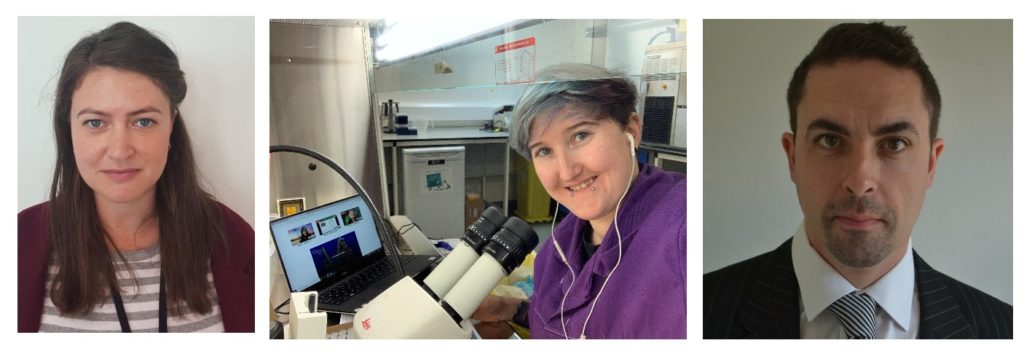Interview to CEFAS

Hello Josie Russell and thank you for having a chat with us today!
Cefas, the Centre for Environment, Fisheries, and Aquaculture Science, gathers UK government’s marine and freshwater science experts to keep seas, oceans and rivers healthy and productive and seafood safe and sustainable by providing data and advice.
What motivated Cefas to join this project?
Answer: At Cefas, we were excited to join the Clean Atlantic project and consortium back in 2017 when the project started so that we could share and build on our knowledge and expertise on marine litter. At Cefas we first started researching marine litter over 30 years ago, looking at litter found on the seafloor by recording items collected as part of routine fisheries surveys, and today we work on projects all over the world. Our work at Cefas strongly aligns with the project’s aims and objectives on improving capabilities to monitor, prevent and remove (macro) marine litter. As an organization we were already working with some of the partners, and so the project was an opportunity to come together and build on some of the research and the evidence base to tackle this global problem.
What have you developed throughout the project? How did interregional cooperation bring added value to your activities?
Answer: At Cefas we have been involved in every work package of the project, so we have been busy! We lead on the work to better understand the current status of marine litter, by gathering and assessing data, knowledge and gaps regarding marine litter in the Atlantic Area. As part of this we have published a seafloor litter assessment, which is also part of the OSPAR 2023 Quality Status Report for the North East Atlantic.. We also worked with other Clean Atlantic partners on the overall assessment of marine litter in the Atlantic Area. We led work on case studies and cost benefit studies across the UK and Ireland, also working with partners in Spain and Portugal. We sent out questionnaires which were developed by other partners to UK stakeholders to understand litter hotspots, best practices to tackle marine litter and beach cleaning methods. We developed an app to help us record seafloor litter as part of our monitoring programme, investigated toxicity of cigarette butts, studied Abandoned, Lost or otherwise Discarded Fishing Gear found in the UK, created scientific education packs, have been part of many outreach events and much more… Working with partners in the five countries (UK, Ireland, Portugal, Spain and France) for all of the work packages was very important as the marine litter problem cannot be solved by one country alone.
Cefas is an agency of Defra, UK Government’s Depart of Environment, Food and Rural Affairs. How did you translate CleanAtlantic outcomes into policy advice?
Answer: At Cefas, we are the UK government’s marine and freshwater science experts. We help to keep our seas, oceans and rivers healthy and productive and our seafood safe and sustainable by providing data and advice to the government and our overseas partners. We work closely with policy makers and ensure we provide them with the latest evidence and assessments to inform decisions to tackle marine litter. We have lead positions at both UK evidence groups and also within OSPAR which is the regional seas convention for the North- East Atlantic so are sharing updates and evidence from the project. Good communications is also a key part of influencing policy. We have done a lot of work in thinking about new and creative ways of translating the findings of the programme, such as through infographics, videos and social media, to really help drive impact and engagement.
What is your best CleanAtlantic memory?
Answer: The in-person coordination meetings and workshops have been our highlight. To work with so many amazing project partners, across the five Clean Atlantic countries and have endless conversations on progress of our actions and future ideas has been inspiring. Also, to be part of other countries workshops with their own stakeholders has been insightful, sharing best practices, harmonized methods and exciting scientific progress.
What are the future activities of Cefas regarding marine litter?
Answer: At Cefas we are working on projects in the UK and all over the world, using our research and innovation expertise to work towards a sustainable blue future for the planet. We excel in our multidisciplinary approach to marine litter science with experts working on fisheries, aquaculture, ecotoxicology, socio- economics, modelling and many other topics bringing added depth to our research and monitoring and assessments. We will continue to develop our research focused on marine litter to better understand the sources, transport and pathways and impacts it has on our environment. Sharing best practices, developing tools and building on our collaborations with other scientists all over the world together working together to provide evidence to inform mitigation measures to tackle marine litter. At this pivotal time when work is underway to develop an international legally binding instrument on plastic pollution, we are supporting the UK government and feeding in on the science and evidence side to make sure we are part of the work happening to tackle this global problem.
Many thanks for your time! You can find all information about CEFAS on their website:
https://www.cefas.co.uk/


 EN
EN PT
PT FR
FR